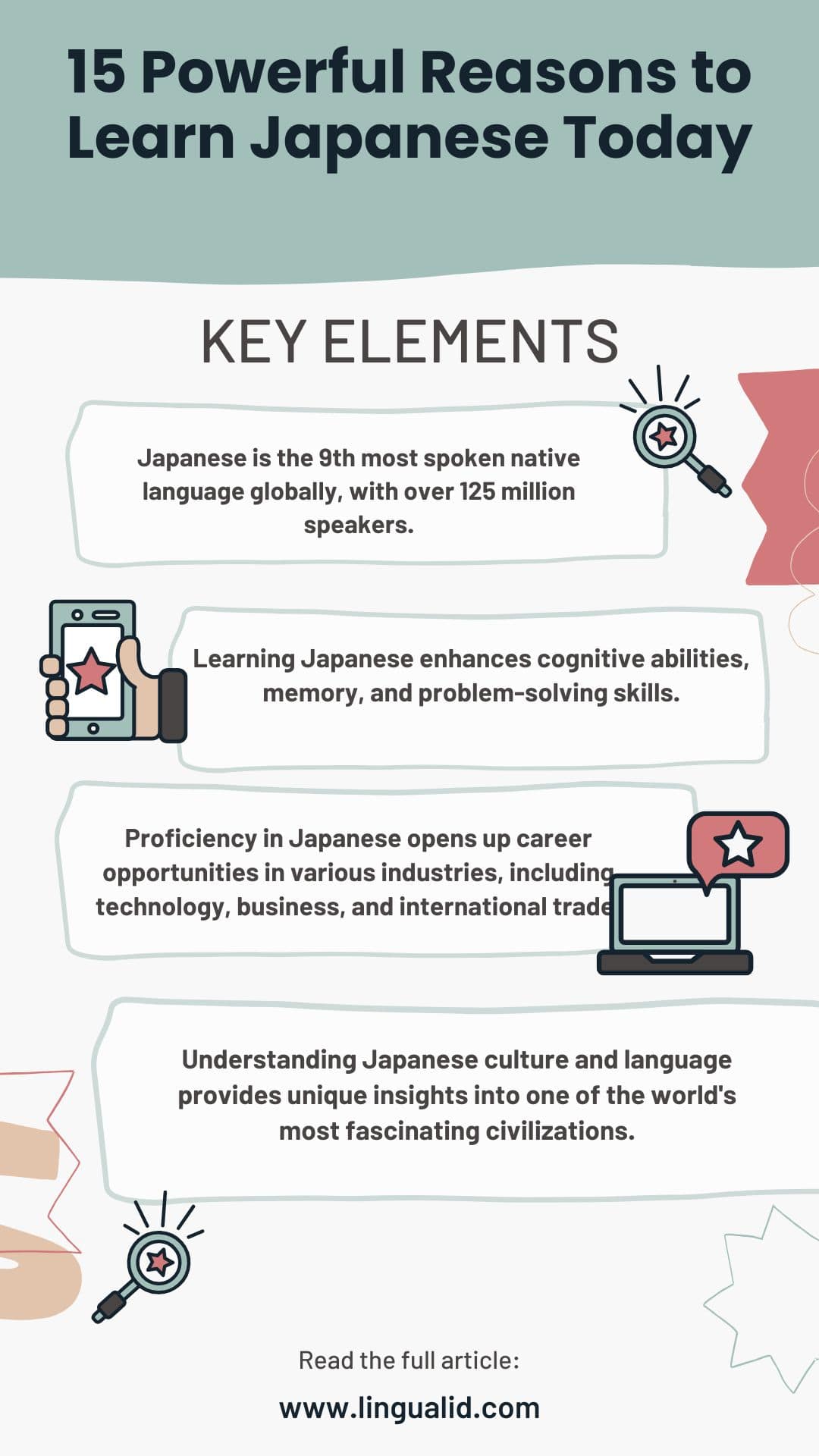Welcome to our post where we will discuss the top reasons to learn Japanese. Learning Japanese opens up a world of over 125 million native speakers. It’s the 9th most spoken native language globally. This language is a key to Japan’s rich culture, better job opportunities, and brain benefits.
Japan’s economy is the third-largest in the world. It offers many chances in tech, entertainment, and business. Knowing Japanese lets you dive into Japan’s digital world, find jobs worldwide, and learn about an ancient and fascinating culture.

Key Takeaways
- Japanese is the 9th most spoken native language globally, with over 125 million speakers.
- Learning Japanese enhances cognitive abilities, memory, and problem-solving skills.
- Proficiency in Japanese opens up career opportunities in various industries, including technology, business, and international trade.
- Understanding Japanese culture and language provides unique insights into one of the world’s most fascinating civilizations.
- Communicating in Japanese enables you to connect with a vast network of native speakers and the vibrant Japanese digital landscape.
- Key Takeaways
- Connect with 125 Million Native Speakers
- Japanese Internet Presence and Digital Culture
- Global Business Impact
- International Business Opportunities
- Teaching and Translation Careers
- Technology Sector Advantages
- Memory Improvement Benefits
- Problem-Solving Enhancement
- Mental Agility Development
- Corporate Opportunities in Japanese Companies
- International Trade Relations
- Asian Market Access
- Cultural Awareness Enhancement
- Cognitive Flexibility Development
- What are the top reasons to learn Japanese?
- How many native speakers of Japanese are there?
- What is the cultural significance of learning Japanese?
- How can learning Japanese benefit my career?
- How does learning Japanese improve access to entertainment and media?
- What are the cognitive benefits of learning Japanese?
- How does learning Japanese benefit travel experiences in Japan?
- What are the business advantages of learning Japanese?
- How does learning Japanese enhance appreciation of Japanese cuisine?
- How does learning Japanese help with other Asian languages?
- How does learning Japanese contribute to personal growth and self-development?
- How can learning Japanese provide access to technology and innovation?
Why Japanese Language is a Global Powerhouse
The Japanese language is a global leader, with over 125 million native speakers, mostly in Japan. It’s among the top 10 languages online, offering a wealth of content and business chances. Japan’s economy is the third-largest, with old companies and tech giants like Toyota, Sony, and Nintendo.
Connect with 125 Million Native Speakers
Japanese is the main language in Japan, connecting you with millions. It opens doors to personal, professional, and cultural experiences. You can build relationships and explore the Japanese business world.
Japanese Internet Presence and Digital Culture
The Japanese digital scene is full of innovation and content. With Japanese being a top online language, learning it unlocks exclusive digital resources. You’ll find the latest tech news, entertainment, and subcultures.
Global Business Impact
Japan’s strong economy offers many opportunities for Japanese speakers. Knowing the language can help in international business, global trade, and the Asian market.
“The Japanese language is a key that unlocks a world of personal, professional, and cultural experiences. Its global reach and influence make it a truly valuable asset in today’s interconnected world.”
Related: All About The Japanese Language
Cultural Gateway to Japan’s Rich Heritage
Learning Japanese opens a world of culture. Japan’s history spans over 16,500 years, from ancient times to today. By studying Japanese, you can understand both old and new Japanese culture, including customs and social ways.
The Japanese language is full of unique words and views on life. For example, “Wabi-sabi” means finding beauty in things that are imperfect. “Ikigai” is about finding your life’s purpose. These ideas give a deep look into the Japanese way of thinking.
“Learning Japanese language and culture is like peeling an onion—the more you explore, the more layers you discover, each offering a deeper appreciation of this fascinating country.” – Dr. Sakura Tanaka, Professor of Japanese Studies
Getting into Japanese culture changes you. It’s about finding peace in a Zen garden or enjoying a tea ceremony. Japan’s culture is rich and helps us grow and understand the world better.
By learning Japanese, you can love Japan’s art, books, and music more. Haruki Murakami’s stories and shamisen music are just the start. Japan’s culture is vast and waiting to be explored.
Learning Japanese is more than just a language. It’s a journey of discovery, growth, and connecting with the world. As you learn Japanese, you’ll love Japan’s culture and its people even more.
Career Advancement and Professional Growth
Learning Japanese can open doors to many career paths. It’s useful in fields like cars, tech, animation, and finance. Japan, being a big player in the global economy, needs people who speak both Japanese and English.
International Business Opportunities
In India, over 1400 Japanese companies are looking for people who speak Japanese. These roles help connect teams and understand cultural differences. Knowing Japanese can also mean higher pay in jobs linked to Japan.
Teaching and Translation Careers
Knowing Japanese can lead to jobs in translation and teaching. Whether you work on your own or for a company, your skills are needed. With Japanese pop culture on the rise, teaching jobs are plentiful.
Technology Sector Advantages
Japan is a leader in tech and innovation. Knowing Japanese can help in tech jobs like coding, engineering, and marketing. It’s a field that’s always changing.
Learning Japanese can lead to many career options. You could work in international business, teaching, translation, or tech. It’s a skill that grows your career and helps you understand different cultures.
Japanese Entertainment and Media Access
Learning Japanese opens a world of Japanese entertainment and media. You can dive into anime, manga, video games, and J-pop music. It’s a unique way to explore Japan’s culture.
Anime, a Japanese animation style, has become popular worldwide. Watching it in Japanese adds depth and authenticity. Manga, Japan’s comic books, also shine in their original form.
Japan’s impact is big in the gaming world. Companies like Nintendo and Sony have made iconic games. Playing these games in Japanese adds to the fun.
Japanese media also includes literature, film, and music. Knowing Japanese lets you understand cultural nuances better. It’s a way to appreciate Japanese culture more deeply.
| Japanese Entertainment Industry Statistics | Data |
|---|---|
| Japanese media market revenue (projected for 2024) | $114.30 billion |
| Number of movies released in Japanese theaters (2022) | 1,143 |
| Market share of leading Japanese streaming platforms | Amazon Prime (22%), Netflix (21%), UNet (14%), Hulu (7%), Disney+ (6%), DAZN (5%) |
Exploring Japanese entertainment and media improves your language skills. It also deepens your understanding and appreciation of Japan’s culture. Enjoying content in its original form enhances the experience and opens new doors.
Enhance Brain Function and Cognitive Skills
Learning Japanese is more than just mastering a new language. It’s a journey that engages multiple parts of the brain. This leads to significant improvements in cognitive skills and brain function. From memory enhancement to problem-solving abilities, studying Japanese can unlock a wealth of mental benefits.
Memory Improvement Benefits
Learning Japanese has a big impact on memory and recall. The intricate system of kanji characters, each representing a unique concept, exercises spatial reasoning and visual interpretation skills. This targeted brain activity has been shown to enhance memory retention and information processing capabilities in learners.
Problem-Solving Enhancement
Navigating the unique grammatical structure and sentence patterns of Japanese language also promotes logical thinking and advanced problem-solving skills. As individuals grapple with the nuances of Japanese, they develop a heightened ability to analyze information, think critically, and find innovative solutions to complex challenges.
Mental Agility Development
Switching between the three writing systems of Japanese – hiragana, katakana, and kanji – further enhances cognitive flexibility and multitasking abilities. This mental dexterity, combined with the brain’s continuous adaptation to a new linguistic landscape, contributes to improved overall mental agility and decision-making skills.
The cognitive benefits of learning Japanese are well-documented, making it a highly rewarding pursuit for those seeking to enhance their brain function and cognitive skills. Whether you’re looking to boost your memory, sharpen your problem-solving abilities, or develop greater mental agility, mastering this dynamic language can unlock a world of cognitive possibilities.
| Cognitive Benefit | Impact on Brain Function |
|---|---|
| Memory Improvement | Exercises spatial reasoning and visual interpretation skills |
| Problem-Solving Enhancement | Promotes logical thinking and advanced analytical abilities |
| Mental Agility Development | Enhances cognitive flexibility and multitasking skills |
“Learning a new language is like opening a door to a whole new world. It’s not just about vocabulary and grammar – it’s about unlocking a wealth of cognitive benefits that can enhance your overall brain function and problem-solving abilities.”
Travel and Cultural Immersion Benefits
Start an exciting journey to Japan, a country loved by over 31.2 million visitors in 2018. Knowing Japanese makes traveling easier. It helps you find hidden spots and enjoy authentic experiences.
Japan’s cities can be tough to navigate without Japanese. Even in big cities, English signs are not everywhere. Knowing basic phrases like “help” and “hospital” is crucial for emergencies.
Learning Japanese lets you dive into the country’s culture. It’s all about respect and politeness. Understanding honorifics like “-san” helps you connect with locals.
| Benefits of Learning Japanese for Travel | Advantages |
|---|---|
| Enhanced Navigation and Communication |
|
| Cultural Immersion and Understanding |
|
| Personalized Travel Experiences |
|
Learning Japanese changes your travel experience. It opens doors to unique adventures and memories. Whether in Tokyo or rural Japan, speaking Japanese unlocks the country’s true beauty.

Reasons to Learn Japanese for Business Success
In the fast-paced world of global business, knowing Japanese can give you an edge. Japan’s strong economy and innovative industries offer many chances for those who speak Japanese. Learning Japanese can lead to great professional growth and success.
Corporate Opportunities in Japanese Companies
Japan has the second-largest economy, with a GDP of $4.9 trillion in 2005. Japanese companies are known for their advanced technology and focus on quality. Knowing Japanese can help you get into top jobs in big companies, in fields like cars, electronics, and finance.
International Trade Relations
Japan plays a big role in international trade. In 2004, the U.S. sold $54 billion worth of goods and services to Japan. Knowing Japanese can help you understand trade agreements and negotiations better. This can help you build strong business relationships and make successful deals.
Asian Market Access
Japan is a key to the growing economies of the Asia-Pacific region. With 88 million Japanese speakers, the language is important online and offline. Learning Japanese can give you an edge in the Asian markets, helping you succeed globally.
In summary, learning Japanese is key for business success. It opens doors to jobs in Japanese companies, helps with international trade, and unlocks Asian markets. Knowing Japanese can be a game-changer in your career.
Unlock Japanese Culinary and Food Culture
Explore the world of Japanese cuisine and discover its rich heritage. Known as “Washoku,” Japanese food is famous for its unique flavors and nutritional value. Learning Japanese can make your food experiences even better, diving into the country’s lively food culture.
Sushi has become a global hit, offering many flavors beyond the usual. Ramen varies by region, from Kyushu’s creamy tonkotsu to Tokyo’s soy sauce-based shoyu. Tempura, with its deep-fried seafood and veggies, is a feast for the senses.
Discover more of Japanese cuisine, like yakitori, gyoza, udon, soba, and donburi. Each dish shows Japan’s unique flavors and traditions. It’s a journey that goes beyond just sushi.
Learning Japanese helps you understand the ingredients and cooking methods of Japanese food. It lets you appreciate the harmony and respect for nature in Japanese cuisine. Your taste buds will thank you for this incredible culinary adventure.
“Washoku, the traditional dietary cultures of the Japanese, is a comprehensive set of skills, knowledge, and traditions that are essential to the health, happiness, and cultural identity of the Japanese people.”
– UNESCO, recognizing Japanese cuisine as an Intangible Cultural Heritage of Humanity
Bridge to Other Asian Languages
Learning Japanese can open doors to other Asian languages. Japan’s close ties with its neighbors make it a great starting point. It’s a chance for language lovers to dive into the world of Asian languages.
Japanese and Korean share similarities in grammar and vocabulary. Japanese also uses Chinese characters, or Kanji, which helps in understanding Chinese. This connection makes learning other Asian languages easier.
- About 20% of Japanese, Korean, and Mandarin Chinese words are the same. This helps learners build a strong base in these languages.
- The Japanese writing system, with Hiragana, Katakana, and Kanji, helps understand Chinese characters.
- Japanese grammar is simple, with only two verb tenses and few irregular verbs. This makes it easier to learn before moving to other Asian languages.
Mastering Japanese can lead to exploring the rich world of Asian languages. It deepens cultural understanding and makes communication across Asia easier.

“Learning Japanese can serve as a springboard for delving into the diverse linguistic landscape of Asia, opening doors to a world of cultural exchange and professional advancement.”
Personal Growth and Self-Development
Learning Japanese is more than just speaking a new language. It opens doors to personal growth and self-improvement. By diving into Japan’s rich culture, you can grow your cultural awareness. This helps you understand different viewpoints better.
This understanding can make you more empathetic and adaptable. It also helps you solve problems in a more nuanced way.
Mastering Japanese writing, including Kanji, Katakana, and Hiragana, boosts your cognitive flexibility. Learning these unique characters sharpens your spatial reasoning and visual skills. It also makes your brain more adaptable and creative.
Cultural Awareness Enhancement
Exploring Japan’s language and culture introduces you to deep ideas like Ikigai (your purpose), Shikata ga nai (acceptance), and Wabi-sabi (beauty in imperfection). These concepts help you appreciate different worldviews. This, in turn, boosts your cultural awareness and personal growth.
Cognitive Flexibility Development
Learning Japanese is a journey of personal growth and self-development. Ideas like Gaman (perseverance), Kaizen (continuous improvement), and Shu-Ha-Ri (stages of mastery) inspire resilience and adaptability. The visual nature of Japanese writing also improves your cognitive flexibility and problem-solving skills.
Embracing Japanese culture and language is a transformative journey. It expands your cultural awareness, enhances your cognitive flexibility, and promotes overall personal growth and self-development.
Technology and Innovation Access
Japan is a global leader in technology and innovation. It excels in cutting-edge research, patents, and groundbreaking advancements. Learning Japanese opens a door to this fast-paced world.
Knowing Japanese gives you an edge in the job market. It opens doors in tech, finance, tourism, and education. Japan’s market is highly sought after, making Japanese skills key for career growth and success.
Japanese language skills improve professional relationships. They help in smoother negotiations and show respect for Japanese business etiquette. Knowing Japanese is great for international business, especially in automotive, robotics, and electronics.
Japan’s science and technology contributions are known worldwide. Knowing Japanese gives access to knowledge not always in English. It enriches academic research and is valuable in the tech industry.
Japan’s innovation focuses on detail, continuous improvement, and tradition. This offers new views on problem-solving and creativity. The Japanese writing system, with its kanji characters, shows the country’s rich technological and cultural heritage.
| Japanese Tech Companies | Global Impact |
|---|---|
| Sony | Leading electronics and entertainment company |
| Panasonic | Pioneering electronics and home appliances |
| Toshiba | Innovating in diverse sectors, including energy and infrastructure |
| Toyota | Automotive industry leader in innovation and sustainability |
Many Japanese companies have a global presence. Knowing Japanese is valuable for working with or for these tech giants.
“Japan’s approach to innovation emphasizes meticulousness, continuous improvement, and respect for tradition, offering fresh perspectives on problem-solving and creativity.”
In summary, learning Japanese opens doors to cutting-edge technology and innovation. It gives insights into Japan’s unique problem-solving mindset. This can greatly improve your career prospects in the fast-changing tech sector.

Conclusion
Learning Japanese can greatly improve your life. It opens doors to new career opportunities and cultural experiences. Japan’s tech, entertainment, and food are just a few reasons why Japanese is valuable today.
Studying Japanese can help you in many ways. It’s great for business, exploring Japanese media, or just to learn more. It also makes you more aware of Asian cultures and the global economy.
Learning Japanese is more than just a skill. It’s a journey that can make you grow personally and culturally. It helps you see the world in a new light. So, if you want to grow, learn, or explore, start learning Japanese today.
FAQ
What are the top reasons to learn Japanese?
How many native speakers of Japanese are there?
What is the cultural significance of learning Japanese?
How can learning Japanese benefit my career?
How does learning Japanese improve access to entertainment and media?
What are the cognitive benefits of learning Japanese?
How does learning Japanese benefit travel experiences in Japan?
What are the business advantages of learning Japanese?
How does learning Japanese enhance appreciation of Japanese cuisine?
How does learning Japanese help with other Asian languages?
How does learning Japanese contribute to personal growth and self-development?
How can learning Japanese provide access to technology and innovation?
Oualid Cheddadi is the founder of Lingualid, a platform that inspires independent language learners worldwide, regardless of the language they are learning. The name “Lingualid” is derived from the Portuguese word for “language,” “língua,” and the last three letters of Oualid’s name, “Lid.”



